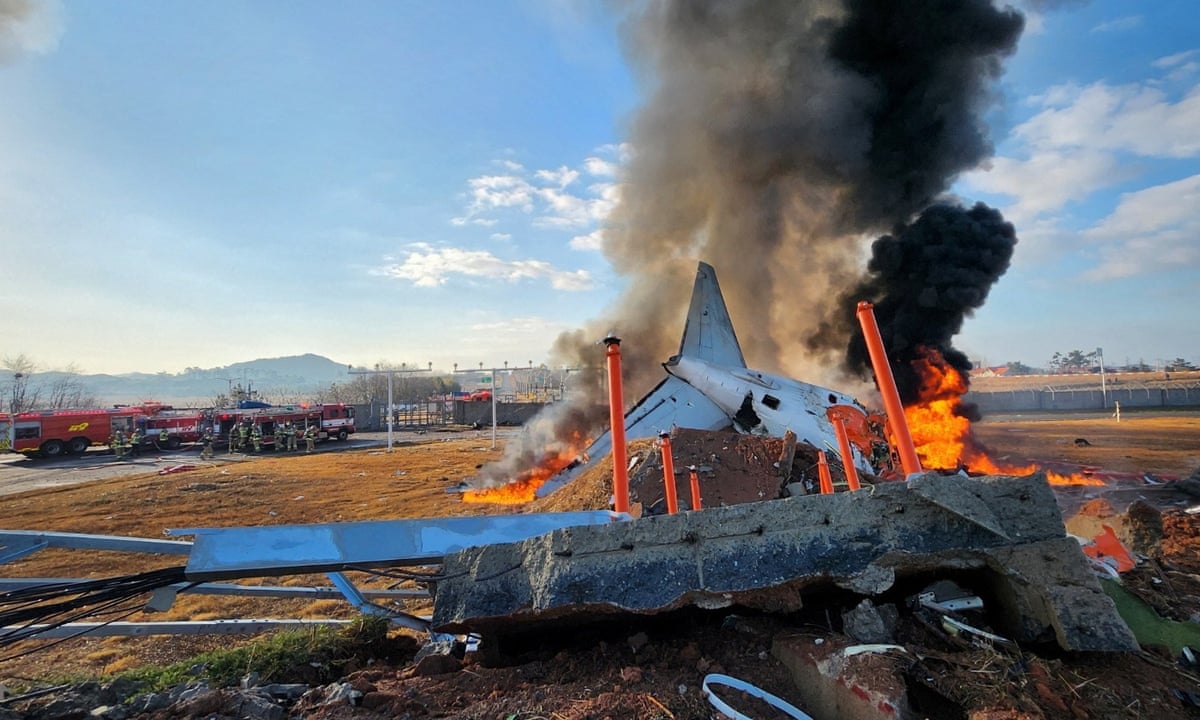- A Jeju Air flight from Bangkok to Muan International Airport crashed into a concrete wall after veering off the runway, killing 179 people; only two crew members survived. People.com
- The crash is attributed to a combination of bird strikes and adverse weather conditions, with investigations ongoing to confirm the exact cause. ABCNews.go.com
- Footage shows the aircraft landing on its belly due to landing gear failure, skidding down the runway, and bursting into flames upon impact. Nypost.com
- Experts criticize the presence of a concrete wall at the end of the runway, citing it as a design flaw that worsened the disaster. Thesun.ie
- The plane's black boxes have been recovered, and analysis is expected to provide further insights into the cause of the crash. WSJ.com
This perspective emphasizes the South Korean plane crash as a tragic outcome of inadequate airport infrastructure. Critics point to the poorly designed runway and the presence of a solid concrete wall at the end of the runway as key factors that exacerbated the disaster. This viewpoint calls for stricter global aviation safety standards and better alignment of infrastructure with emergency scenarios to prevent similar tragedies in the future.
This perspective focuses on the mechanical and operational failures of the Jeju Air flight, including the suspected bird strike that damaged key systems like the landing gear. Despite these challenges, the pilot's skillful attempt at a belly landing is highlighted as a heroic effort to minimize casualties. However, the collision with the concrete wall overshadowed the pilot’s actions, leading to the immense loss of life and underscoring the need for enhanced emergency response systems in aviation.
This perspective centers on the human aspect of the crash, focusing on the profound grief of the victims' families and the broader community. With 179 lives lost, including multiple generations of families, the event is viewed as a poignant reminder of the fragility of human life. This interpretation calls for support for the bereaved and a national reflection on aviation safety to honor the memory of those lost.
Details
Analysis
Bias

Reactions
The article focuses on the fatalities and includes the airline's apology, stating, 'Jeju Air has apologized for the crash, which resulted in 75 deaths,' creating a tone of accountability.
Read full article
The article emphasizes the high death toll and characterizes the crash as a national tragedy, stating, 'This is the deadliest aviation accident in South Korea's history,' creating a somber tone.
Read full article
The article notes, 'Jeju Air faces reputational challenges following the crash,' and focuses on the scale of the tragedy and its impact on South Korea's aviation history.
Read full article
Negative
Sentiment

The article discusses the technical details and timeline of the crash without attributing blame or injecting opinions. For example, it states, 'The crash was caused by a suspected bird strike that led to landing gear malfunction,' focusing on the investigation's findings.
Read full article
The article highlights both the potential bird strike and mechanical failure as causes, stating, 'The bird strike caused the landing gear to malfunction, leading to the crash,' while also noting the government's planned investigation.
Read full article
Neutral
Sentiment
Positive
Sentiment


